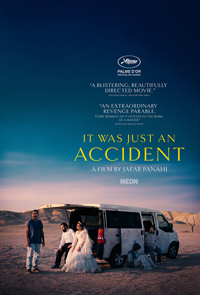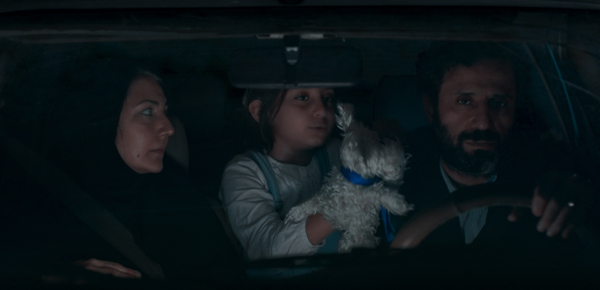Phantom Limb: Panahi Treads Ripples of Retribution
 Jafar Panahi continues to poke the bear with It Was Just an Accident, his latest being another film made without permission from the Iranian government and perhaps his most direct indictment of the Islamic Republic to date. Fate rears its unpredictable head to create a perfect storm for vengeance, and a gathering based on disturbing camaraderie finds a group of victims assembling to determine the fate of a potential victimizer. In many of Panahi’s past films, along with many Iranian artists working within the confines of a brutal regime, his cinema has been coded and metaphorical (though clearly not enough to avoid extreme censure). But this time, there’s no doubt with this explicit critique, which utilizes a familiar narrative formula but has the potency of a poison pen letter aimed to slash through the debilitating censorship demanded of auteurs expected to exist as prisms of propaganda.
Jafar Panahi continues to poke the bear with It Was Just an Accident, his latest being another film made without permission from the Iranian government and perhaps his most direct indictment of the Islamic Republic to date. Fate rears its unpredictable head to create a perfect storm for vengeance, and a gathering based on disturbing camaraderie finds a group of victims assembling to determine the fate of a potential victimizer. In many of Panahi’s past films, along with many Iranian artists working within the confines of a brutal regime, his cinema has been coded and metaphorical (though clearly not enough to avoid extreme censure). But this time, there’s no doubt with this explicit critique, which utilizes a familiar narrative formula but has the potency of a poison pen letter aimed to slash through the debilitating censorship demanded of auteurs expected to exist as prisms of propaganda.
On a dark desolate road a man (Ebrahim Azizi) is on his way home with his pregnant wife and young daughter, accidentally running over a dog. The child is distressed, and shortly after, their vehicle stops working. Luckily, they’re stranded near an isolated shop, where an affable attendant agrees to provide a temporary fix. Vahid (Vahid Mobasseri), an employee, recognizes the driver by the sound his prosthetic leg makes, a small but distinct squeaking noise. Following the family to their home, he lies in wait for the man to be alone, knocking him out with a shovel and driving to a deserted area where he digs a makeshift grave, resolving to bury the man alive. Vahid believes the man to be an intelligence agent who, under direction of the regime, tortured him for months. However, Vahid was blindfolded, and the man protests, claiming his leg injury is a recent one, which means he cannot possibly be Vahid’s assailant.

Conflicted about the idea of potentially murdering an innocent man, Vahid, who has blindfolded the man, brings him to a friend who’d also been tortured by this officer. But since his confidante was also blindfolded, Vahid is directed to visit Shiva (Mariam Afshari), a photographer currently shooting wedding pictures for Goli (Hadis Pakbaten). Both of these women were also tortured by this man, who they all know as Peg Leg. But neither can say for certain, despite recognizing his smell. Collectively, along with Goli’s fiancé Ali (Madjid Panahi), they resolve to visit Hamid (Mohamed Ali Elyasmehr), who is considering something of an uncontrollable live wire. But Hamid is the only one they know who laid eyes on their victimizer. Hamid confirms it’s him, but are they all willing to commit murder? Meanwhile, the man’s daughter is calling, his wife having passed out at home.
The set up of It Was Just an Accident more clearly evokes the tendencies of Panahi’s fellow countryman Asghar Farhadi, who tends to build narratives around a singular event which causes devastating ripple effects to all those in its orbit. But there’s a conciseness which crystallizes immediately, and is also one of Panahi’s most straightforward films to date. Do these people kill this man? And are they justified in doing so? If he is who they believe him to be, this would be the only way a sort of brutal justice will prevail because the terror inflicted upon them was sanctioned by the state.

Many films have dealt with this anxious ambiguity of a victim potentially having the opportunity to turn the tables on a victimizer years after the proverbial dust has settled. Roman Polanski’s excellent adaptation of Ariel Dorfman’s play Death and the Maiden (1994), set after the fall of Pinochet’s terror, for one. More recently, Jonathan Millet’s debut Ghost Trail (2024) finds a displaced Syrian refugee joining a clandestine group tracking down Syrian leaders, hellbent on locating one individual in particular. In essence, these, along with Panahi’s film, are ethical dilemmas. Do we become the thing we hate when we strike back with equal force, given the opportunity? Can our humanity remain intact? Do we retain it after it’s been stripped from us by force? Early on, a character states “What will be, will be,” which is about as apt a statement reflecting on where everything ends up, on a potent moment channeling Poe’s The Tell-Tale Heart.
Reviewed on May 20th at the 2025 Cannes Film Festival (78th edition) – Competition. 103 Mins.
★★★/☆☆☆☆☆


